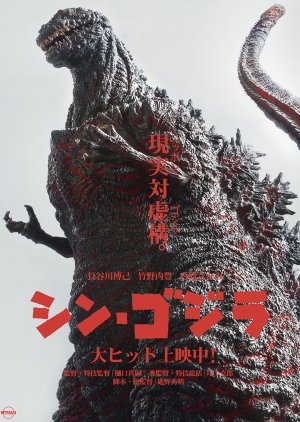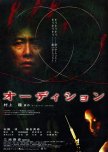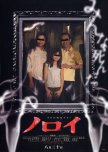
This is a political movie, yes. If you don't like politics and expect an intense fight with Gojira the whole time like those western movie, this movie might not be for you. There are so many political issues they need to handle with. How the government should react when something not written inside the manual happened to the country, what the Prime Minister should do in time of crisis; stay with the people or run away, surrender to pressure or think of other way out. How the ministers should react fast to support the country; find a way out or give up. And probably the most critical point, what Japanese should do for Japan; ask for help from outside to take over or ask for help but still take control of the overall decision. This movie also tackled on sensitive issue for Japanese; the nuclear and radioactive stuffs and the army first big crisis after the post war. Awesome, I tell you.
Non Japanese might find all these stuffs are hard to relate thus tend to focus on the weird side effects, weird Gojira movement. Not to mention the music is so Japanese in so many ways. Try to see this movie in Japanese POV and you will find this movie is an extremely good one. Recommended.
Was this review helpful to you?

This review may contain spoilers
Shin Godzilla: How to Avoid Bungling Up a Crisis Of Epic Proportions
A human drama. Dialogue-heavy. Tedious. Full of long one-liners. No character development. Seemingly unnecessary scenes. Godzilla was like what, 30 mins of the movie?I loved it!
Godzilla itself was a true incarnation of a vengeful god, going beyond human understanding and evolutionary limits.
A movie about the idealized everyday superheroes of Japan. Principled, intelligent, capable, diligent and well-meaning politicians and bureaucrats (those loners, nerds, troublemakers, eccentrics etc) who are in it for the love of their work, Japan and its people. In another word, true public service, not the hypocritical-lip-service type.
What struck me most, from my childhood days of Superman and Ultraman, was the difference between the USAn and Japanese “superheroes”. The contrast between individual vs team effort. Nowhere was it more apparent than here, a movie about a monster born of nuclear radiation and weapons, that quintessential Japanese monster, Godzilla. Having watched the movie, it also became very clear to me why the Japanese loved it, while others had mixed/divided reactions.
This is not a movie for everyone. However, if political satire and crisis management are your interest, this movie would be a good match.
This was truly a Japanese made movie for the Japanese people; those who have had first hand experience with the 2011 Tohoku Disaster, the Fukushima Nuclear Reactor Meltdown event and other natural disasters in recent years, many of which were unprecedented in their scale and marks left. I don’t expect too many people who have lived through the 2011 Tsunami in north-eastern Japan will choose to watch this movie. The loss, grief and trauma are still felt, and the images much too real.
The satire of Japanese politics, bureaucracy and way-of-doing-things, was as entertaining as it was disheartening. The depictions of ineptness and inertia inherent in clunky bureaucracies and democracies, the inability to move beyond commonplace understanding and self-interests, made for both hilarity and resignation. Many of the dialogues made me laugh, and I still have to chuckle whenever I recalled them. It was dry and dark humour at some of their best. Peppered with commentaries about Japanese politics (and the USA role in it) and a smattering of global relations, it was a very realistic movie in many aspects. Themes about ideals and reality were threaded throughout. Lots of scientific jargon too.
Shin-Godzilla was not your garden-variety Kaiju/monster movie (not that I have watched many, this was my first Godzilla movie after all, and even the interest was stoked only because Takahashi Issei was in it, but I don’t think most monster movies were made this way), choked full as it was with political dialogues, bureaucratic maneuvering and crisis/disaster management, it was at its heart, a cautionary tale of human hubris and folly, the human spirit and the triumph of team effort and cooperation (as illusionary and momentary as it was, given the ominous ending).
Those were some of the reasons I found the movie fascinatingly good. The characters certainly captured both the heart and imagination as well. Undoubtedly, a movie well-worth the time spent on it, even with its flaws.
Highlights:
The female characters. They might be a small minority here, but the few who appeared were all strong, competent and oh-so-fantastic, even the “annoyingly-bratty-I-understood-her-Japanese-better than-her-English” Japanese-American special envoy. The character of the Defense Minister was also excellent. (I wish I could say the same for the previous real life female Japanese Defense Minister. I cringed every time she appeared on the news).
The main team members of the “Major Disaster/Crisis Management Task-Force”. Their introduction alone was a wonder to watch. Comical.
The character of Ogashira Hiromi stole the scene the moment she appeared; plain-faced, composed, backbone ramrod-straight, eyes glued to the video of an unknown creature on the computer screen while spewing rapid fire statements and theories on what she was observing, she was simply amazing. Cool, collected, ultra-intelligent and competent, she was always right. Yet, no one ever apologized when they dismissed her opinions, only to be proven wrong the next minute when what she had just stated proved true. (Don’t you just loved it when a woman is always right? I did, at least...)
And here comes my next favourite character, Yasuda Tatsuhiko. The only one to apologize to Ogashira when her theory proved accurate. He had previously countered her theory as absurd, but when she was proven correct, he did the right thing - rare too - and apologized, publicly. It was such a surprise and joy to watch (and an interaction to launch a thousand ships). It was certainly no puzzle why both characters were so popular; characterizations and acting were superb.
The main protagonist - if there was anyone fitting that description, it would be him - Yaguchi Rando. A third generation politician, he was one of the many deputy cabinet secretaries dotting the cabinet. Principled and straightforward, he was both earnest and idealistic, the type of politician you wished really existed. (I am sure these people exist, just not at the highest level...)
The interim Prime Minister. The veteran actor was compelling in both his presence and acting. His helpless resignation as to his role in an interim government facing imminent nuclear bombing and loss was poignantly bitter to behold.
The idea that no matter how horrifying and destructive Godzilla was, humans are worse. (Certainly no argument with this conclusion).
The impressive cast and numerous cameos. I could only count on one hand the names which I do know of, yet there were more than 300 actors, and while I do not know of their names, many were certainly familiar faces.
The wonderful soundtrack. I have no direct experience with any of the Godzilla franchise, but perhaps I have heard of the music here and there before, I have no idea. No matter, the music utilized here felt very old-school, and yet, refreshingly relevant. (The type of soundtrack I imagined the first iconic and other older movies would have incorporated into their movies).
The destruction of Tokyo. Chilling and terrifying.
(The scenes of the attempts at bringing down Godzilla with trains reminded me of the times I have seen the mock play of boys ramming their toy trains together or into a figurine/s. It was beyond funny).
Was this review helpful to you?
Pathetic monster!
I saw the trailer for "Godzilla minus one", and I thought I'd watch "Shin Godzilla" to get in the mood.The most enjoyable thing about a monster movie, is usually the monster itself.
Here we have a muppet with strabismus that transforms itself into a stiff plastic toy.
I've seen movies from the 70s with better special effects.
I came to the conclusion that this movie is not about Godzilla, it's about people talking.
All the characters talk, all the time, at the same time, loudly. It's insupportable.
After about an hour, I gave up.
Was this review helpful to you?

L'éco-responsabilité selon Anno
Sortie en 2016, tout a surement été dit sur le Shin Gozilla de Hideaki Anno. Mais étant passé à côté à l'époque ( Qu'est-ce que je pouvais bien regarder à ce moment-là ? ), mon visionnage récent de Shin Ultraman m'invita à me plonger dans ce chef-d'œuvre du film hommage aux films de Kaijus des années 50-60 du cinéma japonais. Une mise en abyme, dont Anno est si friand.Le réalisateur-créateur, de Evangelion n'a jamais caché, ni son amour, ni ses inspirations pour ses films de genre. Et il a cherché ici à être le plus proche de l'ambiance et de l'esthétique de l'époque tout en ancrant Gozilla dans notre temps. Taclant au passage les Américains et leurs adaptations foireuses, dénaturant complètement le sujet et l'âme de l'œuvre originale. Pour ceux qui voudraient en savoir plus sur la biographie du maître Anno, je vous invite à visionner le drama Aoi Honoo. Adaptation délirante de sa vie d'étudiant de cinéma. Délirant, ç'aurait pu être la marque de fabrique de ce énième Godzilla, mais le réalisateur-scénariste a insufflé un réalisme et un humanisme rarement atteints dans le genre. Même si la métaphysique est sa spécialité, il a cherché, ici, à rester le plus terre à terre possible. Un comble pour un film retraçant l'attaque d'un dinosaure géant qui tire des lasers nucléaires.
Un réalisme comme on en voit que dans les films de guerre, retraçant des batailles réelles et décrivant avec précision chaque évènement et même armes employées. Avec un état-major rongé par les doutes, découvrant la situation en même temps que le spectateur et devant prendre des décisions, peut-être responsables de milliers de morts. On suit, non pas le superflic, militaire ou pompier qui est en proie au doute, en plein divorce et choix de garde de sa fille, comme dans un film américain, mais les ministres et autres secrétaires d'État, dans leur travail. Face à une crise inédite, d'un niveau bien plus critique que celle de la Covid. Nous n'aurons donc pas de tranches de vie quotidienne, pour accentuer l'horreur et magnifier le dévouement du héros-cowboy. Mais on bouffera des briefings glaçants, réalistes, où les ministres paraissent profondément humains et démunies face à ce qui les dépasse.
Bien sûr, une telle production à son lot d'acteurs banquables (en 2016), mais "exit" les featuring américains qui auraient eu toutes leurs places dans cette production où l'ombre de l'oncle Sam est omniprésente. Hasegawa Hiroki, l'éternel Tachibana Manpei de Manpuku Ramen (à voir absolument) est bluffant de réalisme dans son rôle de secrétaire de cabinet, aux responsabilités trop grandes pour son costume trois pièces. Mais Ishihara Satomi, que j'adore pourtant, appuis trop sur son côté pouffe américaine, dans son rôle, la rendant antipathique au possible, pour ceux qui apprécient la délicatesse à la japonaise. Mais tout cela est évidement voulu par Anno qui par le grain de l'image, l'absence de maquillage des acteurs (sauf pour Satomi-chan, donc) a cherché non pas à les enlaidir, mais à les humaniser.
On est ici, face à un brulot anti-tout, finalement. Antiaméricain et plus généralement anti-impérialiste, voir antimilitariste. Mais aussi une critique face au monde politique, fait finalement de dirigeant en papier. On en attendait pas moins du créateur de Nadia ou Evangelion. Et comme pour ses chefs-d'œuvre d'animation, la mécanique, comme les monstres, sont magnifiés au possible. À l'instar de son ami Miyazaki, il apporte un soin extrême aux machines tout en dénonçant leurs utilisations meurtrières. On est vraiment proche de l'univers du créateur du Château dans le ciel, même dans ce film de genre. Mais le soin extrême se retrouve également dans les scènes extérieures où Anno a cherché à reproduire les attaques des villes, des raffineries ou dans les montagnes avec des plans imitant réellement les films de Kaiju et de Kokusatsu. Alors qu'à l'époque, des maquettes de ville et de campagnes étaient le décor d'acteurs costumés en Casimir ou Super Sentai et que pour Evangelion (autre hommage, faut-il le rappeler ?), l'animation était déjà bluffante, on est ici, scotché par la technique. Mélange de marionnette ou de costume grotesque, de 3D légère et de prises de vues réelles. Tout s'imbrique pour donner à la fois un côté réaliste, avec ses scènes de panique où des milliers de figurants courent dans un Tokyo magnifié (l'autre star du film) et en arrière-plan sa majesté Godzilla tout lazer dehors. Digne des plus grands films catastrophes à budget pharaonique, Gozilla est à la fois un typhon, un raz de marré et un tremblement de terre à lui tout seul. Parabole sur la résilience du peuple japonais face à ses catastrophes naturelles, l'ombre d'Hiroshima plane aussi sur le film, et la fin rappellera une autre fin que les États-Unis ont encore du mal à justifier, 80 ans après.
Un film donc, d'une grande humanité, à la réalisation et au jeu d'acteur impeccable. Un brulot politique et écologique, qui ne surprendra pas les fans de la première heure, mais qui décevra certainement les fans de blockbusters américains. Pour le côté lent et grotesque de la bête (j'adore), pour l'utilisation outrancière des musiques d'époque (j'adore aussi). Mais c'est peut-être le meilleur hommage que l'on peut faire au dernier dinosaure. Rassurez-vous les Yankees, la critique de Shin Ultraman ne sera pas aussi dithyrambique, mais probablement que vous l'adorerez, autant que vous avez détesté Shin Gojira. Tous les goûts sont dans la nature et il faut savoir en prendre soin. Sinon, elle va te le faire comprendre à grand coup de lazer dans ta gueule !!!
Was this review helpful to you?
















![Kaiju,Tokusatsu,Mecha,etc* [Multi-List]](https://i.mydramalist.com/aEgymt.jpg)
![Kaiju,Tokusatsu,Mecha,etc* [Multi-List]](https://i.mydramalist.com/Zbd0q_4t.jpg)
![Kaiju,Tokusatsu,Mecha,etc* [Multi-List]](https://i.mydramalist.com/YAZ2gt.jpg)
![Kaiju,Tokusatsu,Mecha,etc* [Multi-List]](https://i.mydramalist.com/9xYJyt.jpg)
![Kaiju,Tokusatsu,Mecha,etc* [Multi-List]](https://i.mydramalist.com/xbjEr_4t.jpg)






















